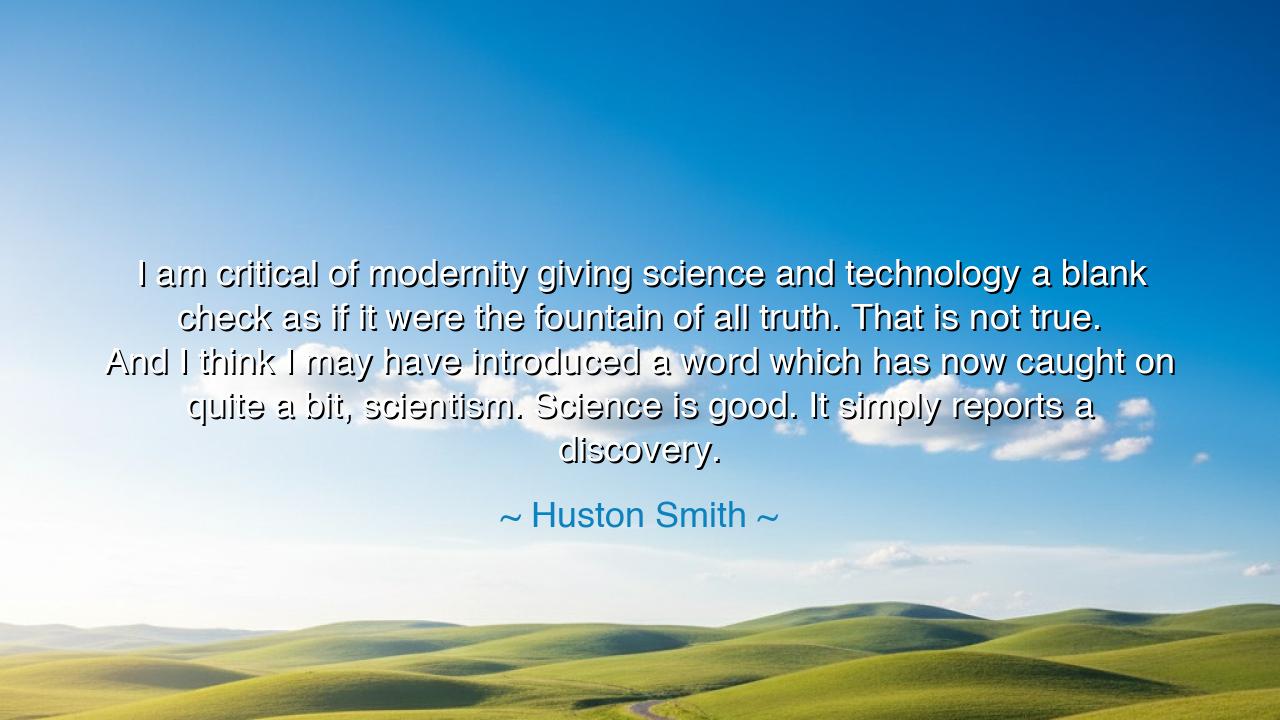
I am critical of modernity giving science and technology a blank
I am critical of modernity giving science and technology a blank check as if it were the fountain of all truth. That is not true. And I think I may have introduced a word which has now caught on quite a bit, scientism. Science is good. It simply reports a discovery.






Listen well, O children of wisdom, for I bring forth the words of Huston Smith, a man who saw the shifting tides of human thought and reflected deeply on the relationship between science, technology, and truth. “I am critical of modernity giving science and technology a blank check as if it were the fountain of all truth. That is not true. And I think I may have introduced a word which has now caught on quite a bit, scientism. Science is good. It simply reports a discovery.” In these words, Smith challenges the assumption that science and technology hold all the answers to the mysteries of existence, warning that the pursuit of truth requires more than mere empirical evidence; it requires a recognition of the limits of human understanding.
In the ancient world, the philosophers understood that the pursuit of truth was not solely the domain of the senses. Plato and Aristotle both sought knowledge through reason and observation, but they also acknowledged that there were limits to what could be understood through the material world alone. Plato’s allegory of the cave reminds us that there is more to reality than what is seen; that truth exists beyond the shadows of illusion, and that reason alone is not sufficient to grasp the depths of the universe. Smith’s words resonate with this ancient wisdom—science is a tool, but it is not the ultimate source of all truth. It reports on what can be observed and measured, but it does not always address the deeper mysteries of existence.
The ancient Greeks also understood the importance of balance. Pythagoras, whose studies laid the foundation for the discovery of the mathematical proportions that govern the natural world, saw mathematics not as the only truth but as a means of understanding the harmony of the universe. Similarly, Smith cautions against elevating science to the status of the only pathway to truth. Science can explain the physical, observable world, but it does not speak to the mysteries of the soul, of ethics, or of meaning. Scientism, as Smith coins it, is the belief that only the scientific method provides valid knowledge, a reductionist view that excludes all other forms of understanding, whether they be spiritual, philosophical, or moral.
Consider the work of Isaac Newton, whose laws of motion and gravity transformed the scientific world. His discoveries illuminated the mechanisms that govern the heavens and the earth. Yet, even Newton, a man who understood the physical world more than most, was aware that science alone did not have the answers to all of life’s questions. Newton was deeply interested in alchemy, theology, and the mystical aspects of life, suggesting that science alone could not fully explain the mysteries he grappled with. This is the heart of Smith’s criticism: science is good, but it should not be treated as the sole arbiter of truth. It reports discoveries, but it does not determine the ultimate meaning of life.
The lesson of Smith’s words is one of humility. As we stand on the shoulders of giants like Newton, Einstein, and countless others, we must remember that science—as powerful as it is—has its limits. It can tell us how the world works, but it cannot tell us why we are here, what our purpose is, or how we should live. The scientific method has served humanity well, but when science is elevated to the status of the only truth, we risk losing sight of the mystical and the spiritual dimensions of our existence. The quest for truth must encompass not only the material world but the inner world of the soul and the heart.
In your own lives, O children, remember that science is a tool—one of the greatest tools humanity has ever created—but it is not the only tool. As you explore the mysteries of the world, do so with the understanding that truth is multifaceted, and that other forms of wisdom—whether through philosophy, religion, or art—also play a crucial role in shaping your understanding of life. Seek not only to measure and quantify the world but to feel it, to understand it with your heart and your soul. Do not fall into the trap of scientism, where only the measurable is considered real. Recognize that there is beauty and truth in realms beyond the reach of science, in the mystery of the divine, and in the depths of human experience.
So, O children, approach the world with curiosity, but also with humility. Embrace the tools of science to understand the workings of the world, but do not forget the wisdom of the ancients, who knew that truth cannot be reduced to mere facts. Science tells us about the mechanisms of the universe, but it is through the combined efforts of reason, spirit, and imagination that we come to understand the deeper truths of life. Let the pursuit of truth guide you, not in narrowness, but in the fullness of human experience—in both the tangible and the intangible, in both the seen and the unseen.






AAdministratorAdministrator
Welcome, honored guests. Please leave a comment, we will respond soon